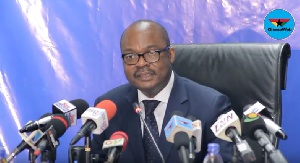The poor performance of some banks in Ghana, leading to their collapse is an indication that the central bank, the Bank of Ghana (BoG), needs to undergo reforms, Eric Amoako Twum, Deputy Chief Executive Officer of the Ghana Export Promotion Authority (GEPA), has said.
“It is reassuring that the new governor of the Bank of Ghana is being decisive in showing conviction, but I believe that even the Bank of Ghana itself needs serious reforms and it has to be based on benchmarking, being able to look at it from the perspective of what has happened elsewhere.
“We cannot sit and allow a total financial meltdown in this country, it has happened in other parts of the world,” he said on TV3’s New Day Programme on Saturday, 4 August 2018.
The BoG has fused five banks – The Royal Bank, BEIGE Bank, Sovereign Bank, The Construction Bank and uniBank – into the Consolidated Bank Ghana Limited, since they will not be able to meet the GHS400 million minimum capital requirement.
Central Bank Governor Dr Ernest Addison explained on Wednesday, 1 August 2018 that the move was part of measures to streamline the financial sector.
The Bank of Ghana also revealed that shareholders of erstwhile uniBank, have admitted to using the bank’s funds, which they took under “questionable circumstances”, to purchase a lot of real estates in their names.
Dr Addison, told journalists: “uniBank’s shareholders and related parties have admitted to acquiring several real estate properties in their own names using the funds they took from the bank under questionable circumstances”.
“Promises by these shareholders and related parties to refund monies by mid-July 2018 and legally transfer title to assets acquired back to uniBank have failed to materialise”, Dr Addison said.
According to him, “Based on the Bank of Ghana’s review of KPMG’s assessment of the financial condition of uniBank, the Bank of Ghana has concluded that uniBank is insolvent and has no reasonable prospect of rehabilitation, or a reasonably credible path to viability.
“In arriving at this conclusion, the Bank of Ghana has carefully considered the options provided under Act 930 to rehabilitate a bank under official administration.
“The Bank of Ghana finds that in the interest of promoting financial stability, protecting the interests of depositors and lenders, minimising the costs to the tax payer, and restoring integrity in the financial sector, the only reasonable option is to fully resolve the bank by revoking its banking licence and winding down its affairs through a receiver appointed by the Bank of Ghana”.
Business News of Saturday, 4 August 2018
Source: classfmonline.com













